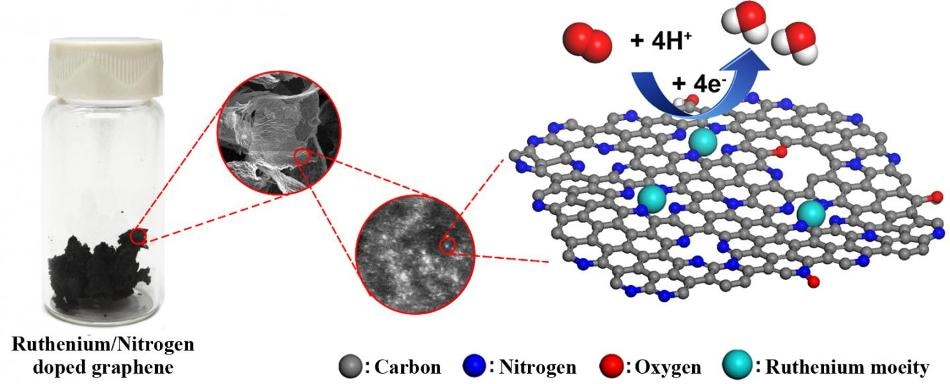Jun 29 2017
A durable catalyst for high-performance fuel cells has been fabricated by Rice University Scientists by attaching single ruthenium atoms to graphene.
 Rice University Scientists have fabricated a durable catalyst for high-performance fuel cells by attaching single ruthenium atoms to graphene. CREDIT Chris Zhang/Rice University
Rice University Scientists have fabricated a durable catalyst for high-performance fuel cells by attaching single ruthenium atoms to graphene. CREDIT Chris Zhang/Rice University
Catalysts that drive the oxygen reduction reaction that allows fuel cells to turn chemical energy into electricity are generally produced from platinum, which stands up to the acidic nature of the cell’s charge-carrying electrolyte. However, platinum is expensive, and for decades Scientists have searched for a suitable replacement.
Chemist James Tour, whose lab produced the material along with his colleagues at Rice and in China, stated that the ruthenium-graphene combination may fit the bill. In tests, the material’s performance easily matched that of conventional platinum-based alloys and defeated iron and nitrogen-doped graphene, another contender.
A paper on this new material has been published in the American Chemical Society journal ACS Nano.
Ruthenium is often a highly active catalyst when fixed between arrays of four nitrogen atoms, yet it is one-tenth the cost of traditional platinum. And since we are using single atomic sites rather than small particles, there are no buried atoms that cannot react. All the atoms are available for reaction.
James Tour, Chemist, Rice University
Tour stated that the atom-thick form of carbon, turned out to be reasonably straightforward as a result of spreading single ruthenium atoms across a graphene sheet. This process involved dispersing graphene oxide in a solution, followed by loading in a minimal quantity of ruthenium and then freezing the new solution and changing it into a foam.
Baking that at 750 oC (1,382 oF) in the presence of hydrogen and nitrogen gas resulted in reducing the graphene and locking nitrogen atoms to the surface, thus providing sites where the binding of ruthenium atoms could take place.
Materials produced at lower and higher temperatures were not good, and those made at the correct temperature but without either nitrogen or ruthenium proved that the quality of the reaction depended on the presence of both.
The new material displayed exceptional tolerance against methanol crossover and carbon monoxide poisoning in an acidic medium, both of which degrade the effectiveness of fuel cells; such degradation is indeed a constant issue with standard platinum fuel cells.
Lead Authors of the paper include Graduate Students Chenhao Zhang of Rice and the Chinese Academy of Sciences, Shanghai; Junwei Sha of Rice, the Chinese Academy of Sciences and Tianjin University, China; and Juncai Dong and Dongliang Chen of the Chinese Academy of Sciences.
Co-authors of the paper are alumni Huilong Fei, Mingjie Liu and Qifeng Zhong, Postdoctoral Researchers Sadegh Yazdi and Xiaolong Zou and Graduate Student Jibo Zhang; Emilie Ringe, an Assistant Professor of Materials Science and Nanoengineering, and Boris Yakobson, the Karl F. Hasselmann Professor of Materials Science and NanoEngineering and a Professor of Chemistry, all of Rice; Naiqin Zhao of Tianjin University and the Collaborative Innovation Center of Chemical Science and Engineering, Tianjin, China; and Haisheng Yu and Zheng Jiang of the Chinese Academy of Sciences.
Tour is the T.T. and W.F. Chao Chair in Chemistry and also a Professor of Computer Science and of Materials Science and Nanoengineering at Rice.
The research was supported by the Air Force Office of Scientific Research and its Multidisciplinary University Research Initiative, the China Scholarship Council, the American Chemical Society Petroleum Research Fund, the Department of Energy, the Robert Welch Foundation, the National Natural Science Foundation of China and the Jianlin Xie Foundation of the Institute of High Energy Physics, Chinese Academy of Science.